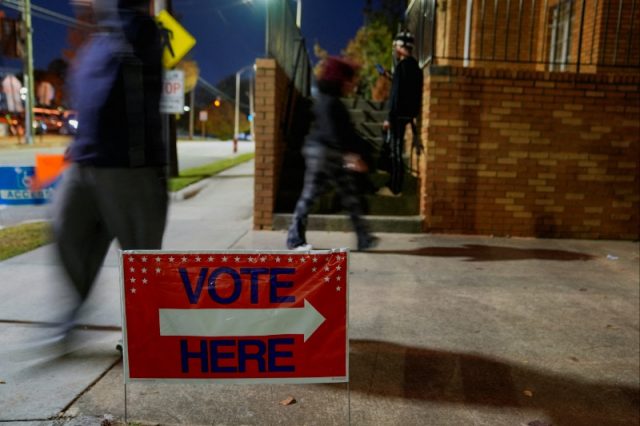
- At least two polling sites in Georgia briefly evacuated
- FBI says Michigan, Arizona and Wisconsin also targeted
- FBI says many hoax threats appear to come from Russian email domains
- Russia denies election interference
ATLANTA — Hoax bomb threats, many of which appeared to originate from Russian email domains, were directed on Tuesday at polling locations in four battleground states – Georgia, Michigan, Arizona and Wisconsin – as Election Day voting was underway, the FBI said.
“None of the threats have been determined to be credible thus far,” the FBI said in a statement, adding that election integrity was among the bureau’s highest priorities.
At least two polling sites targeted by the hoax bomb threats in Georgia were briefly evacuated.
The two locations, in Fulton County, both re-opened after about 30 minutes, officials said, and the county was seeking a court order to extend the locations’ voting hours past the statewide 7 p.m. deadline.
Georgia’s secretary of state, Brad Raffensperger, a Republican, blamed Russian interference for the Election Day bomb hoaxes.
“They’re up to mischief, it seems. They don’t want us to have a smooth, fair and accurate election, and if they can get us to fight among ourselves, they can count that as a victory,” Raffensperger told reporters.
The Russian embassy in Washington said insinuations about Russian interference were “malicious slander.“
“We would like to emphasize that Russia has not interfered and does not interfere in the internal affairs of other countries, including the United States,” the embassy said in a statement. “As President Vladimir Putin has repeatedly stressed, we respect the will of the American people.”
Ann Jacobs, head of the Wisconsin Elections Commission, said fake bomb threats were sent to two polling locations in the state capital of Madison, but they did not disrupt voting.
A spokesperson for Jocelyn Benson, Michigan’s Democratic secretary of state, said there had been reports of bomb threats at several polling locations, but none were credible.
Benson’s office had been notified that the threats may be tied to Russia, the spokesperson said.
An FBI official said that Georgia received more than two dozen threats, most of which occurred in Fulton County, which encompasses much of Atlanta, a Democratic stronghold.
Police in DeKalb County, Georgia – another Democratic stronghold – later responded to bomb threats at seven locations, according to a county press release. Five of the locations were polling places and were evacuated. County officials were seeking an emergency order extending opening times at the voting sites.
A senior official in Raffensperger’s office, speaking on the condition of anonymity, said the Georgia bomb hoaxes were sent from email addresses that had been used by Russians trying to interfere in previous U.S. elections.
The threats were sent to U.S. media and polling locations, the official said. “It’s a likelihood it’s Russia,” the official said.
Adrian Fontes, the Arizona secretary of state, a Democrat who is the chief election official in the swing state, said four fake bomb threats had been delivered to polling sites in Navajo County, located in the northeastern part of the state and which includes three Native American tribes.
“Vladimir Putin is being a prick,” Fontes said.
Democratic Vice President Kamala Harris and Republican former President Donald Trump are locked in a tight race to win the White House. Opinion polls suggest the contest is too close to call.
The phony bomb threats mark the latest in a string of examples of alleged interference by the Russians in the 2024 election.
On Nov. 1, U.S. intelligence officials warned that Russian actors manufactured a video that falsely depicted Haitians illegally casting ballots in Georgia. Intelligence officials also found that the Russians created a separate phony video that falsely accused someone associated with the Harris presidential ticket of taking a bribe from an entertainer.
U.S. intelligence officials have also accused Russia of interfering in previous U.S. presidential elections, especially the 2016 race which Trump won against Democratic candidate Hillary Clinton.
(Reporting by Tim Reid and Rich McKay in Atlanta and Sarah N. Lynch in Washington; Additional reporting by Nathan Layne and Ned Parker; Editing by Rosalba O’Brien and Leslie Adler)









